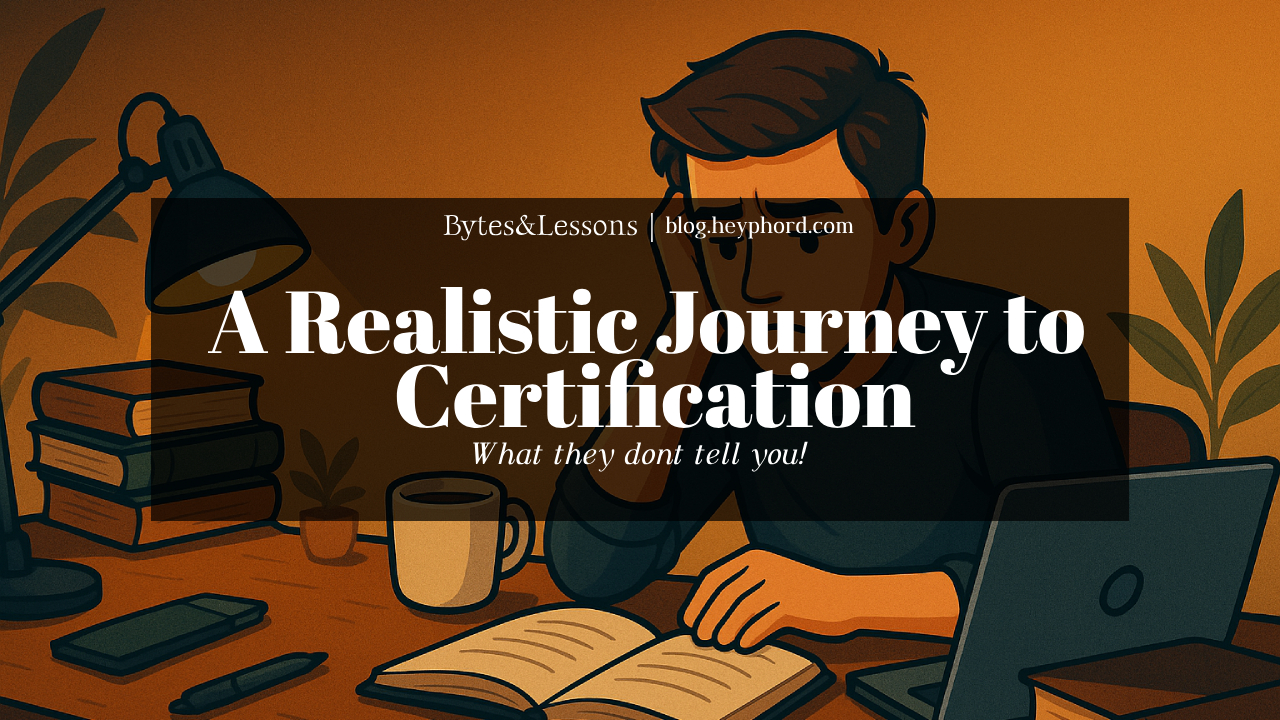Part 3: A Realistic Journey to Certification: What They Don't Tell You!

CHOOSING YOUR STUDY GUIDE, AND COMMITTING TO IT
“Give me six hours to chop down a tree and I will spend the first four sharpening the axe.”— Abraham Lincoln
Getting here means you are ready to start studying. Good Job! Let's keep reading to find out how to choose your study guide.
Choosing your study guide is very tricky, but very vital to passing your exam. Selecting a guide depends on the following factors, listed in order of priority.
- What is your primary way of learning?
- What has worked for others in passing that exam?
- Your “WHY” and “WHEN”?
- Cost of the study guide?
What is your primary way of learning?
Audio, Video, Reading, Classrooms or a combination of them? Know your primary way of learning, and choose a study guide accordingly.
For Audio-visual learners, platforms like Udemy, Coursera, and YouTube offer excellent video tutorials.
For readers, there are some high-quality books you can buy physically or as an ebook. Some courses on Coursera also come with lecture slides if you prefer to read. Using flashcards for learning is also a good way to do passive learning.
Some exam companies also provide classroom tutorials if you prefer learning in a classroom. Additionally, studying with peers preparing for the same exam can boost motivation and retention.
In the end, you decide your study material.
What has worked for others in passing that exam
What I usually do is ask people who have already passed an exam to recommend study guides. If you don't know anyone personally, head to linkedin and search for the certification you are planning to take. You will see others who passed and are kind enough to share their study guides. First, thank them for sharing and see if any of their guides fit with your learning style.
Your “WHY” and “WHEN”
Your WHY determines your WHEN - in other words, your motive for taking the exam should determine the right time for the final exam.
Short Timeline (Short WHEN)
If working with a tight deadline, focus 60% of your efforts on solving exam questions and 40% studying concepts.
Your study materials should include:
- Mock questions
- Cheat sheets.
- Flash cards
- Explanations for both Correct and Wrong Answers for each question
Long Timeline (Long WHEN)
If you have more time, reverse the strategy: focus 60% of your efforts on studying concepts and 40% solving exam questions.
I cannot stress this enough: make sure you UNDERSTAND the concepts and not just memorize facts, know why things are the way they are, and you will be able to tackle any question, no matter how the question is phrased.
Cost of the study guide
Cost plays an important role in choosing your study guide, especially if you are on a tight budget. Back in college, while preparing for the job market, I decided to pursue the Java OCP certification to help me stand out in interviews. However, I couldn't afford the premium study guides, so I resorted to the following budget-friendly options:
- Public Git repos of questions and answers from other developers preparing for the exam
- YouTube Tutorials
- Older editions of the Java OCP ebooks
- Developer blogs on Java
Oracle, AWS and many certification providers offer classroom-based training that covers the full exam scope. Though expensive, they can provide a good Return on Investment.
COMMITTING TO YOUR STUDY GUIDE
Certification exams are difficult and mentally taxing; give them the commitment they deserve.- Hayford O.A
One key mistake I made in my learning journey was not being focused on my study guide. I often got sidetracked by interesting but not essential short courses and side projects. This lack of focus significantly delayed my progress and is one of the main reasons why it took me more than a year to pass my AWS exam.




